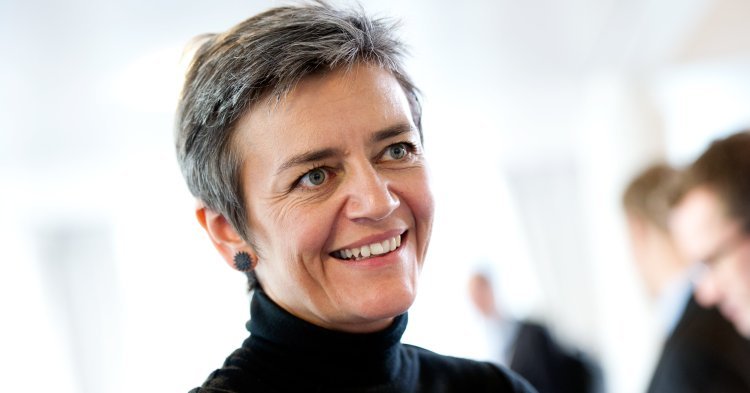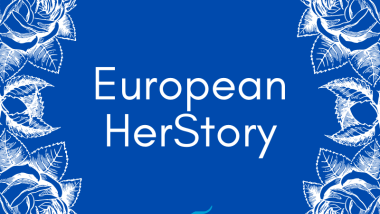Born to a family of Lutheran ministers, Margrethe Vestager (Glostrup, Denmark, 1968) read Economics at the University of Copenhagen, joining the Social Liberal Party (Radikale Venstre, RV, Renew Europe) at a very young age. In 1998, aged 30, she became Minister for Economics and Ecclesiastical Affairs in Poul Nyrup Rasmussen’s centre-left coalition government; in 2007, she seized her party’s leadership in the Danish Parliament, leading RV into the 2011 general election and doubling the party’s share of seats.
Following the formation of Helle Thorning-Schmidt’s coalition government, Vestager was appointed Minister for Economic and Interior Affairs, playing a crucial role in overseeing the government’s heavy spending cuts to Denmark’s social welfare system. Indeed, writes Bernardo de Miguel for El País, Vestager was widely acknowledged to be as powerful as Thorning-Schmidt herself, if not more, and is rumoured to have inspired the famous Danish political drama Borgen - a suggestion, de Miguel adds, which Vestager has neither confirmed nor denied.
Her term as Economic Minister also introduced her to the wider European audience: as ECOFIN chair in 2012, during Denmark’s presidency of the EU, she was instrumental in driving through legislation to save the Union’s financial and banking sector, ruthlessly applying a liberal agenda which won the admiration of many European leaders (such as former German Finance Minister Wolfgang Schäuble and then-Luxembourgish PM Jean-Claude Juncker) but exposed her to fierce criticism from anti-austerity parties across the continent.
Upon the Juncker Commission’s formation in 2014, Vestager was given the powerful Competition portfolio, replacing Commission grandee Joaquín Almunia. Her first term in the European Commission, which was marked by her fight against tech giants such as Google, Facebook or Apple, was widely viewed as successful, and Vestager soon became a popular figure in Brussels. Her style was noticeably different to Almunia’s laissez-faire approach: from a very early stage, she acknowledged the need to challenge Big Tech’s regulatory arbitrage, and pioneered the use of state aid mechanisms to challenge said firms’ tax avoidance. Yet the very nature of her role – one which involves long, arid legal disputes against firms which hire armies of lawyers – meant little could be achieved in five years: a second term, she herself claimed, would be needed to ‘get things done’.
Margrethe Vestager was one of Renew Europe’s leading faces in the 2019 European Parliament election, and was widely deemed to be Macron’s favoured candidate for the Commission presidency. Although her party’s refusal to fully embrace the Spitzenkandidaten system, which Vestager herself had heavily criticised in 2018, did away with her chances of seizing the top job, she was allowed to retain the Competition department, while becoming one of Ursula von der Leyen’s three powerful Executive vice-presidents, in charge of the pompously named “a Europe fit for the digital age” portfolio.
Her years at the helm of the Commission’s fight against Big Tech have showcased her main political assets: her firm commitment to a set of political principles -a liberalism which, over time, has been tempered by touches of social democracy and market regulation–; and her refusal to bow down to the hostility of the private sector; of Member States such as France and Germany, who criticised her refusal to authorise the controversial Alstom-Siemens merger); and of Donald Trump himself, who labelled her ’tax woman’ and accused her of ‘really hating’ the USA.
Perhaps more importantly, Vestager’s work has been underlaid by a clear political vision. In a 2018 interview with The Guardian, she warned of social media’s danger – its power to ‘deactivate democracy’, with individuals retreating ‘to our own private bubble and our private feed of things that we would like to hear’ –, and defended the importance of competition law and state aid regulation in ensuring markets remain open, fair and democratic vis-à-vis consumers. It is this vision which has driven her most recent cases before the General Court of the EU: her victory in Luxembourg v Commission, which involved state aid granted to Fiat; and her defeat in Netherlands v Commission, a case involving Starbucks, and in the recent high-profile Apple v Commission dispute.
Apple v Commission, in which the General Court rejected that Ireland’s failure to tax Apple’s global profits amounted to state aid under Article 107 TFEU, has signified an important setback for Vestager’s political and regulatory project - Apple’s fine of €13bn was the largest the Commission had ever imposed, and the case was widely viewed as decisive for the precedent it would set in the regulation of digital platforms. Indeed, writes Nils Pratley for The Guardian, the Commission’s defeat may require some radical re-thinking of its legal approach to Big Tech’s tax evasion. This may be even more necessary in light of the recent election of Ireland’s Pascal Donohoe, whose government partook in the challenge against the Commission’s Apple decision, to the Eurogroup presidency.
Yet the Apple ruling, which may still be appealed before the ECJ, should not overshadow Vestager’s crucial work in the past years: her challenge against Google for its abuse of its dominant position, her success against Facebook for misleading regulators about its acquisition of WhatsApp, or her investigation into Google’s use of Android mobile devices to strengthen the dominance of its own mobile apps over its competitors.
With the Commission facing an increasingly uphill battle to challenge the likes of Apple and Google, Vestager’s appreciation of the risks posed by digital platforms, and her determination to drive through the necessary regulation, are arguably more important than ever: the USA’s recent withdrawal from the OECD’s digital taxation talks, as well as the increasing relevance of competition law and the digital economy in China and India, have showcased the need for the EU to establish itself as a normative superpower in the fields of competition law, digital taxation or the right to privacy, ensuring such firms remain accountable for their actions.
Europe’s most important face in this fight will be Margrethe Vestager: the daughter of two Lutheran ministers who rose, from the small town of Ølgod, to become, in the words of The Economist, ‘the rich world’s most powerful trustbuster’.



Follow the comments: |
|
